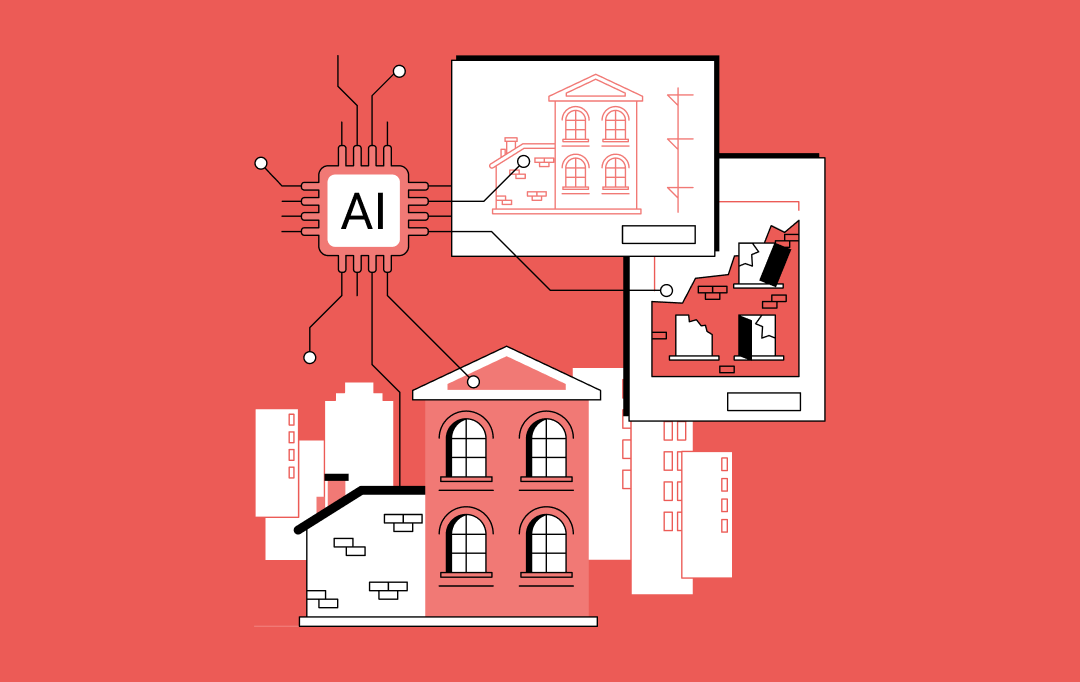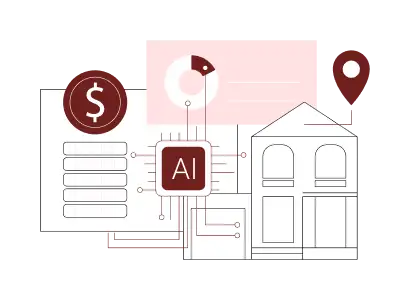- At a Glance: How AI Is Transforming Real Estate in Australia
- 10 Key Applications of AI in Real Estate in Australia That Matter
- 1. Property Valuations and Market Predictions
- 2. Property Matching and Search
- 3. Virtual Tours and Property Visualization
- 4. Investment Analysis and Risk Assessment
- 5. Marketing Automation and Content Creation
- 6. Lead Management and Agent Support
- 7. Predictive Maintenance and Property Management
- 8. Fraud Detection and Compliance Monitoring
- 9. Sustainable Development and Energy Efficiency
- 10. Market Trends and Urban Planning
- Use Cases of AI in Real Estate in Australia With Real-Life Examples
- 1. OBrien Real Estate: Virtual Property Tours
- 2. LJ Hooker: AI-Generated Listings
- 3. Microburbs: Suburb Forecasting and Investment Insights
- 4. Centuria Capital: AI-Driven Data Centres
- 5. REA Group: AI for Marketing and Market Insights
- 6. Rent.com.au: AI-Powered Rental Management
- How to Implement AI in Real Estate
- Define Business Objectives
- Assess Available Data
- Choose the Right AI Tools
- Integrate with Existing Systems
- Train Staff and Build Awareness
- Beginning Simple and Growing Slowly
- Monitor, Measure, and Improve
- Ensure Compliance with Australian Regulations
- Challenges With AI-Powered Real Estate and Solutions to Overcome Those
- Data Quality and Availability
- The Human Factor Problem
- Concerns About Privacy and Data Security
- Integration With Legacy Systems
- Ethical Problems and Algorithmic Bias
- Regulatory and Compliance Considerations for AI in Australian Real Estate
- The Future Of Artificial Intelligence For Real Estate in Australia
- Smart Buildings and Digital Twins
- Urban Planning and Predictive Market Analysis
- Autonomous Valuation and Negotiation Engines
- Generative AI for Property Content and Insights
- Hyper-Personalised Marketing Platforms
- Integrate AI Seamlessly into Your Real Estate Business with Appinventiv
- FAQs
Key takeaways:
- AI in real estate in Australia is shifting from experimentation to operational necessity, helping agencies and developers handle market volatility, rising demand, and tighter compliance expectations.
- Early adopters are using AI to reduce operational bottlenecks, improve valuation accuracy, and make faster investment decisions in competitive Australian markets.
- Top AI use cases in Australian real estate include property valuations and forecasting, predictive maintenance for portfolio management, and data-driven investment analysis to support smarter investment decisions.
- Government-backed housing expansion and evolving market conditions are accelerating demand for smarter, scalable digital tools across real estate operations.
Australia’s real estate market is navigating a period of significant structural change. Government-backed housing initiatives, shifting demand patterns, and regional price volatility are reshaping how developers, agencies, and investors plan for growth.
The National Housing Accord aims to deliver 1.2 million new homes over five years from mid-2024, while the Housing Australia Future Fund has committed $10 billion toward 30,000 social and affordable homes. These initiatives are adding momentum to a market already under pressure to move faster and operate more efficiently (Source: NHSAC).
At the same time, complexity is increasing. Rental vacancy rates remain tight, market dynamics vary sharply across regions, and data volumes are growing faster than teams can manually analyse. This is why artificial intelligence is moving from experimentation to practical adoption across the sector.
AI in real estate in Australia is helping businesses improve valuation accuracy, automate operational tasks, identify investment opportunities earlier, and reduce risk exposure. As agencies and property firms look for ways to scale without increasing overheads, AI is becoming a practical layer that supports smarter, faster decision-making rather than replacing human expertise.
To quickly understand where value is being created, it helps to step back and look at the transformation at a glance.
Let Appinventiv help you adopt AI technology in your real estate business to stay ahead of the competition and scale efficiently
At a Glance: How AI Is Transforming Real Estate in Australia
- AI-powered valuations: Faster, data-backed pricing and market forecasting.
- Hyper-personalisation: Smarter property recommendations based on buyer behaviour and preferences.
- Operational automation: Streamlined listings, lead management, and marketing workflows.
- Compliance and fraud monitoring: Improved risk detection and regulatory alignment.
- Predictive property management: Early maintenance alerts that reduce long-term costs.
- Data-driven investment decisions: Clearer visibility into high-growth suburbs and future demand patterns.
10 Key Applications of AI in Real Estate in Australia That Matter
Australia’s property market is going through big changes, and artificial intelligence is behind much of what’s happening. AI utilization helps buyers, sellers, investors, and real estate agents get better results. Here’s what AI in real estate in Australia means for the market today.
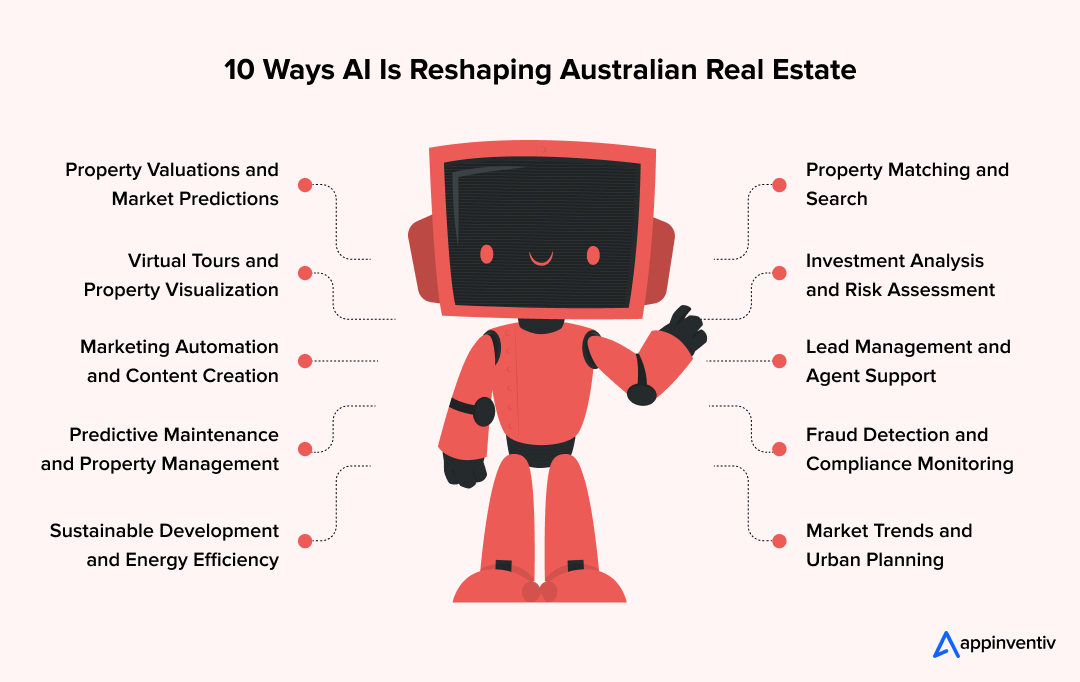
1. Property Valuations and Market Predictions
One of the key applications of AI in Australian real estate is the ease of making property valuations and market trend predictions. Traditional valuation methods may not be effective in Australia’s diverse property markets.
AI for real estate in Australia analyses vast amounts of data, including past sales, migration patterns, new infrastructure projects, and broader economic indicators, to provide actionable insights for agents, investors, and developers. This provides property owners and investors with a clearer understanding of their properties’ worth and the potential direction of prices across various regions.
2. Property Matching and Search
Finding the right property used to mean weeks of searching through listings that didn’t fit. AI in real estate in Australia now powers search sites that learn what people actually want based on how they browse and what they click on.
These platforms go beyond basic filters like price and suburb, factoring in daily routines and personal preferences to show properties that make sense for each person’s situation.
3. Virtual Tours and Property Visualization
Real estate agencies are now using AI for real estate Australia to create detailed 3D property tours and virtual staging that feels surprisingly real. Buyers can walk through homes from their couch, see how different furniture might look, or even picture what a renovation could achieve.

This works especially well for people in regional areas or overseas investors looking at Australian properties; they get a genuine feel for the space without having to travel. The technology has become good enough that many buyers feel confident making decisions based on these virtual experiences alone.
4. Investment Analysis and Risk Assessment
Real estate AI Australia platforms give investors access to detailed market analysis that used to require expensive consultants. These systems analyze rental returns, growth prospects, and market stability by examining neighborhood patterns, upcoming infrastructure projects, and local economic health.
For investors eyeing fast-changing Australian suburbs where markets can swing quickly, this kind of analysis helps spot genuine opportunities while steering clear of potential problem areas. The data often reveals trends that aren’t obvious from just driving through a suburb or reading property listings.
5. Marketing Automation and Content Creation
AI transforming Aussie real estate shows up most clearly in property marketing. These platforms write compelling property descriptions automatically, make listings rank better on search engines, and run targeted social media campaigns without agents having to manage every detail.
Properties end up in front of the right people while agents save hours of work each week. The smart part is how AI figures out which photos or descriptions get the most clicks on Domain and Realestate.com.au, then applies those insights to future listings.
6. Lead Management and Agent Support
Today’s AI platforms work like having an AI real estate agent assistant that never takes a break. They help agents figure out which leads are worth pursuing first, send follow-up messages automatically, and track how interested each buyer actually is.
By identifying the prospects most likely to buy, AI prevents agents from chasing dead ends and allows them to focus on deals that are more likely to close. In Australia’s competitive markets, where being first to respond or remembering personal details can win or lose a sale, this kind of support makes a real difference.
7. Predictive Maintenance and Property Management
Property managers now use AI for real estate agents to catch maintenance issues before they become problems. These systems monitor equipment and warn when air conditioners need servicing, or hot water systems might fail, often months ahead of time.
This saves landlords money and keeps tenants satisfied, especially in larger apartment complexes where tracking multiple units can be challenging.
8. Fraud Detection and Compliance Monitoring
Real estate and AI work together to identify suspicious transactions by examining deal structures and ownership records. AI-based fraud detection systems help agencies meet Australia’s regulatory requirements for property sales and anti-money laundering compliance.
Beyond avoiding regulatory issues, agencies with strong compliance records build greater client trust and stronger business relationships.
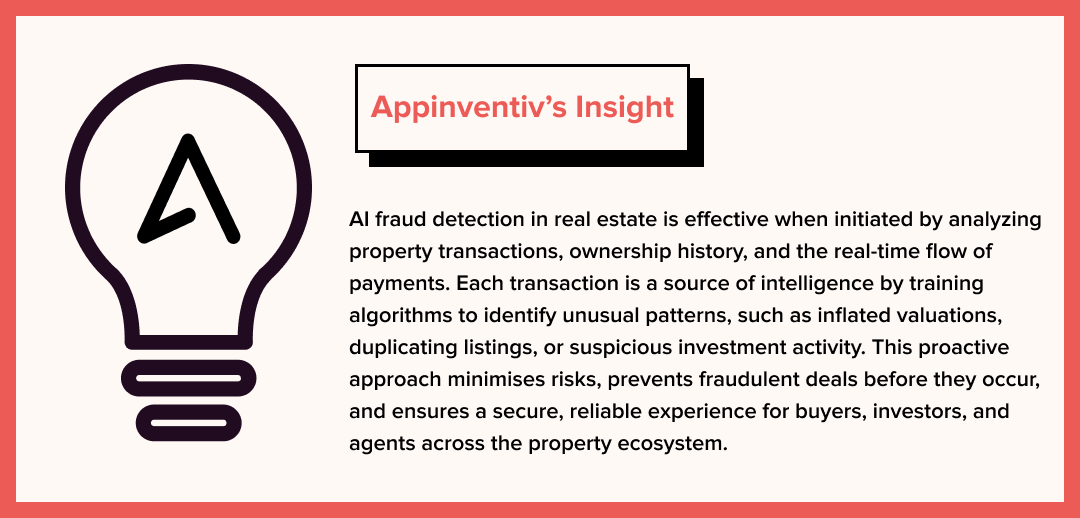
9. Sustainable Development and Energy Efficiency
Australian developers are finding that AI and real estate tools help them understand energy usage patterns and make better building decisions. These systems identify which upgrades will actually save money while helping projects qualify for NABERS and Green Star certifications.
The process used to involve a lot of trial and error, but now developers can see upfront which green features will pay off. Buildings designed this way tend to attract buyers and renters who want lower utility bills and smaller environmental footprints.
10. Market Trends and Urban Planning
Government planners and property developers now rely on Australian AI agent for real estate data to understand where cities are growing and what housing types are needed. In Melbourne, Sydney, and Brisbane, this information shapes decisions about new developments before ground is broken.
The result is fewer situations where apartment towers go up in areas that already have enough housing, while other suburbs struggle with shortages. Better planning means developers face less risk, communities get appropriate infrastructure, and public money gets spent more wisely.
Use Cases of AI in Real Estate in Australia With Real-Life Examples
Australian real estate is changing fast, and AI sits at the heart of this transformation. From better marketing campaigns to smarter property management and sharper investment analysis, leading agencies and proptech companies are using these tools to work more efficiently, serve clients better, and base decisions on solid data. Here’s how some major players are leveraging AI in the Australian market.
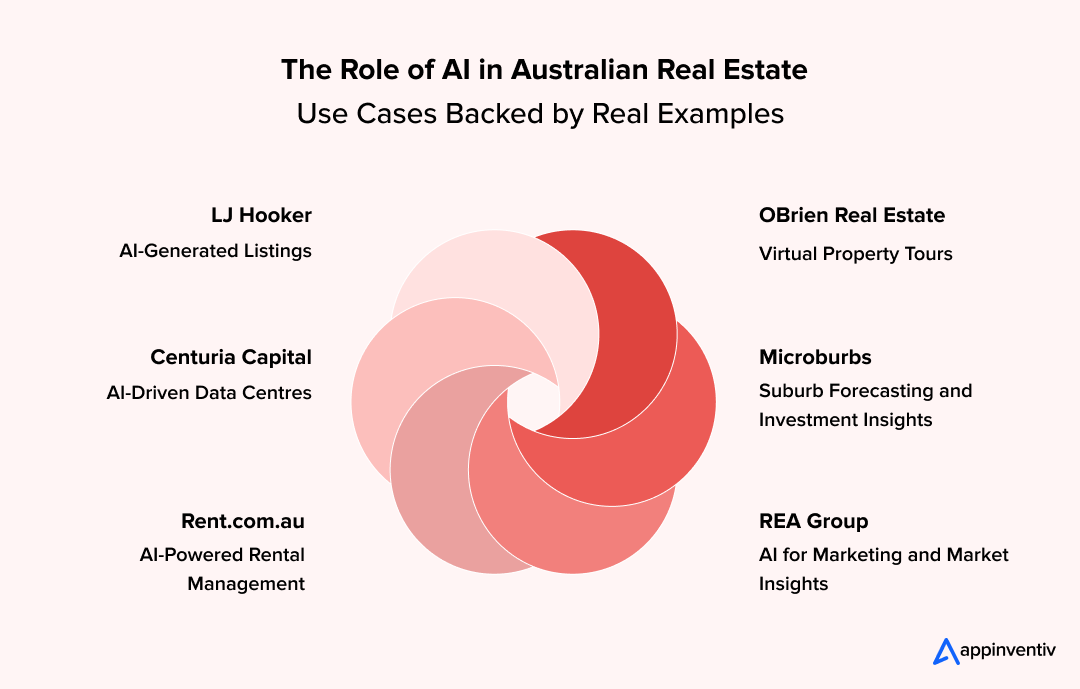
1. OBrien Real Estate: Virtual Property Tours
OBRIEN Real Estate, a big Melbourne agency, has embraced AI solutions for real estate to build immersive 3D property tours using Matterport and CAPTUR3D technology. Buyers and renters can measure rooms accurately, picture potential renovations, and walk through properties from their couch, cutting down on multiple physical inspections. This saves everyone time and boosts engagement, particularly for interstate or international buyers looking at Australian properties.
2. LJ Hooker: AI-Generated Listings
LJ Hooker experimented with ChatGPT to automatically create property descriptions, demonstrating how AI tools for real estate agents can streamline operations. By automating routine writing tasks, agents gain more time for high-value activities like client relationships and deal negotiation. However, one listing accidentally mentioned non-existent schools, highlighting why human review remains essential. Despite this glitch, the trial shows AI’s potential to reduce paperwork while enhancing marketing quality.
3. Microburbs: Suburb Forecasting and Investment Insights
Sydney-based Microburbs harnesses AI in real estate in Australia to provide granular neighborhood analysis for buyers and investors. Their platform analyzes zoning laws, infrastructure developments, demographic shifts, and construction trends to forecast suburb growth potential. This helps investors identify emerging areas with strong rental prospects, while developers can pinpoint optimal locations for new developments. The tool proves especially valuable in Australia’s dynamic property landscape, where market timing makes all the difference.
4. Centuria Capital: AI-Driven Data Centres
Centuria Capital, a major Australian property investment firm, has embraced AI for real estate in Australia through strategic investments in ResetData’s AI-powered data facilities. These cutting-edge centres fuel high-performance computing and cloud AI services while maximizing energy performance. The move strengthens portfolio returns for investors and positions properties to meet Australia’s commercial sector’s escalating tech requirements.
5. REA Group: AI for Marketing and Market Insights
REA Group, which operates realestate.com.au, uses AI for real estate Australia to streamline content creation, customize property suggestions, and deliver forward-looking market analysis. Their AI systems study user patterns to recommend properties that match individual preferences, while predictive tools help agents and investors stay ahead of market movements. This blend of automation and smart analytics makes marketing more efficient and creates better experiences for buyers.
6. Rent.com.au: AI-Powered Rental Management
Rent.com.au incorporates real estate AI Australia to transform rental property operations. The platform employs AI to streamline property advertisements, sharpen search functionality, and forecast tenant interest. Landlords see quicker tenant placements and smarter rent pricing, while renters receive tailored property matches. The technology also enables agents to monitor property metrics across Australia’s major markets, leading to more responsive and effective rental portfolio oversight.
Explore how AI solutions can simplify operations and accelerate growth.
How to Implement AI in Real Estate
For Australian property agencies, investors, and developers, artificial intelligence integration goes beyond adopting new technology; it’s about creating genuinely smarter, more profitable operations. A methodical approach delivers smooth implementation, tangible results, and minimal business disruption.
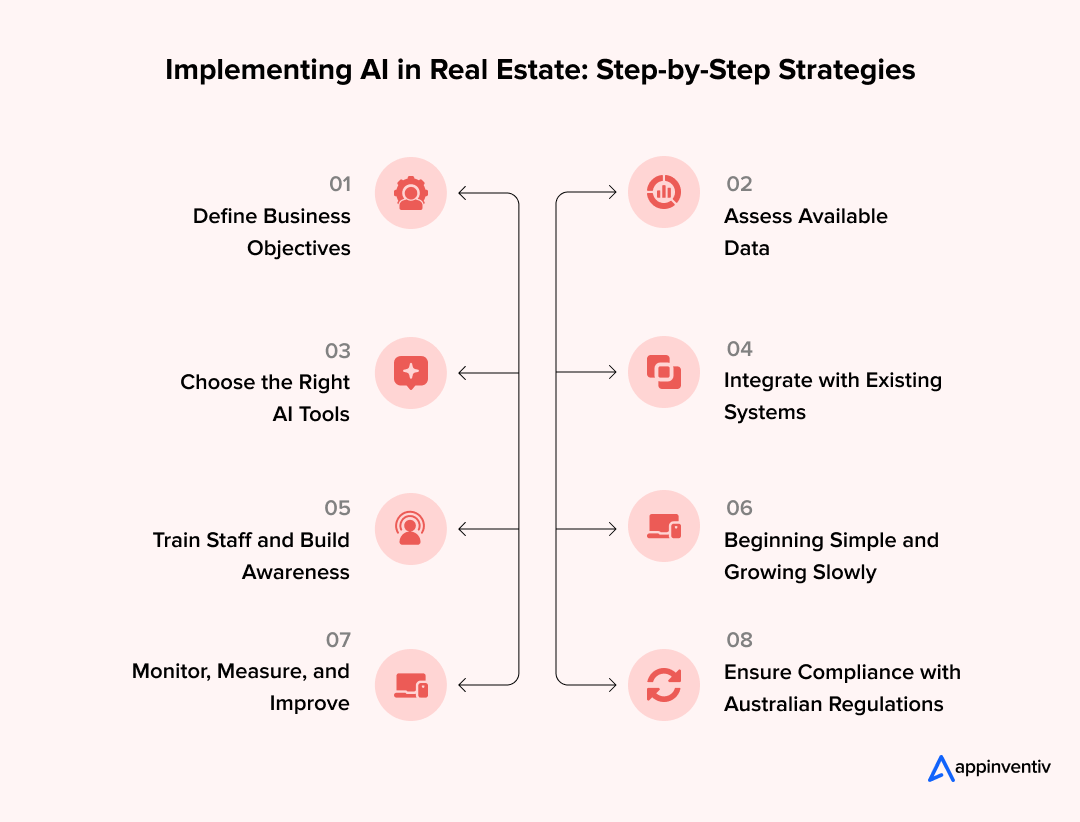
Define Business Objectives
Start by identifying exactly what problems need solving. An agency might prioritise faster client response times, while investors focus on portfolio analysis tools. Developers often require better project feasibility assessments. Matching technology investment to actual operational needs prevents costly mistakes and ensures meaningful returns.
An Australian AI agent for real estate delivers maximum value when configured for specific tasks like lead qualification or targeted property recommendations, creating direct links between technology deployment and business performance.
Assess Available Data
Your AI system’s performance directly reflects the information you feed it. Take a thorough review of your property records, transaction data, demographic information, and market trends. Missing or poor-quality data creates unreliable predictions and skewed recommendations that hurt your business.
A real estate AI assistant can audit what you currently have, spot the gaps, and tell you which datasets need work to support better decisions.
Choose the Right AI Tools
Now that you know your goals and understand your data situation, picking tools becomes clearer. Various platforms handle different jobs, pricing predictions, client management, and property valuations. Investors typically seek detailed analytics and forecasting features, whereas agencies often prioritize client relationship tools.
AI for real estate investment platforms lets you examine portfolios with greater accuracy, helping you make smarter choices across residential and commercial properties.
Integrate with Existing Systems
The custom-built AI-powered real estate software is designed to integrate seamlessly with your existing CRMs, listing portals, and customer management systems. Poor integration creates headaches for your team and kills productivity. Use middleware or APIs to connect everything smoothly and keep workflows intact.
Generative AI in real estate can plug directly into your current marketing and sales platforms, automatically creating property descriptions, promotional content, and custom reports without extra manual work.
Train Staff and Build Awareness
AI falls short when your team doesn’t know how to utilize it effectively. Run workshops, show live demos, and create real-world scenarios so staff see how these tools actually help their daily work.
A property AI consultant might discover that AI for real estate marketing handles ad placements and listing optimization automatically, giving them more time for client relationships. Effective training builds confidence and helps people overcome resistance to change.
Beginning Simple and Growing Slowly
Rollout on a huge scale raises the risk, whereas pilot programs offer less risky access points. The agencies may start by using AI chatbots in real estate to handle rental inquiries or automated valuation tools and then move on to more advanced ones.
In the case of developers or agencies working in multiple sectors, AI for commercial real estate can be tested in one project, e.g., office rent demand analysis, and subsequently extended to larger portfolios.
Monitor, Measure, and Improve
The use of AI is never a stagnant phenomenon. Agencies have to monitor the outcomes, analyze the payback, and revise algorithms with the new market changes. The satisfaction of clients, the accuracy of the system, and the time saved can be measured using monitoring tools. The continuous analysis will ensure that AI remains aligned with core objectives and evolves to meet new market needs.
Ensure Compliance with Australian Regulations
Lastly, AI systems should not violate Australian laws, such as the Privacy Act 1988, and be ethically responsible. They do this through regular audits to avoid bias and transparency to keep clients’ trustful. The importance of ethical practices will be even higher when AI interacts directly with buyers or tenants to ensure that decisions are fair and responsible.
Challenges With AI-Powered Real Estate and Solutions to Overcome Those
Australian real estate is embracing artificial intelligence, but the road hasn’t been smooth. Agents, developers, investors, and property managers are running into real problems that need fixing before AI becomes truly useful across the industry. Let’s have a look at some of the key implementation challenges of AI in real estate and solutions to tackle those.
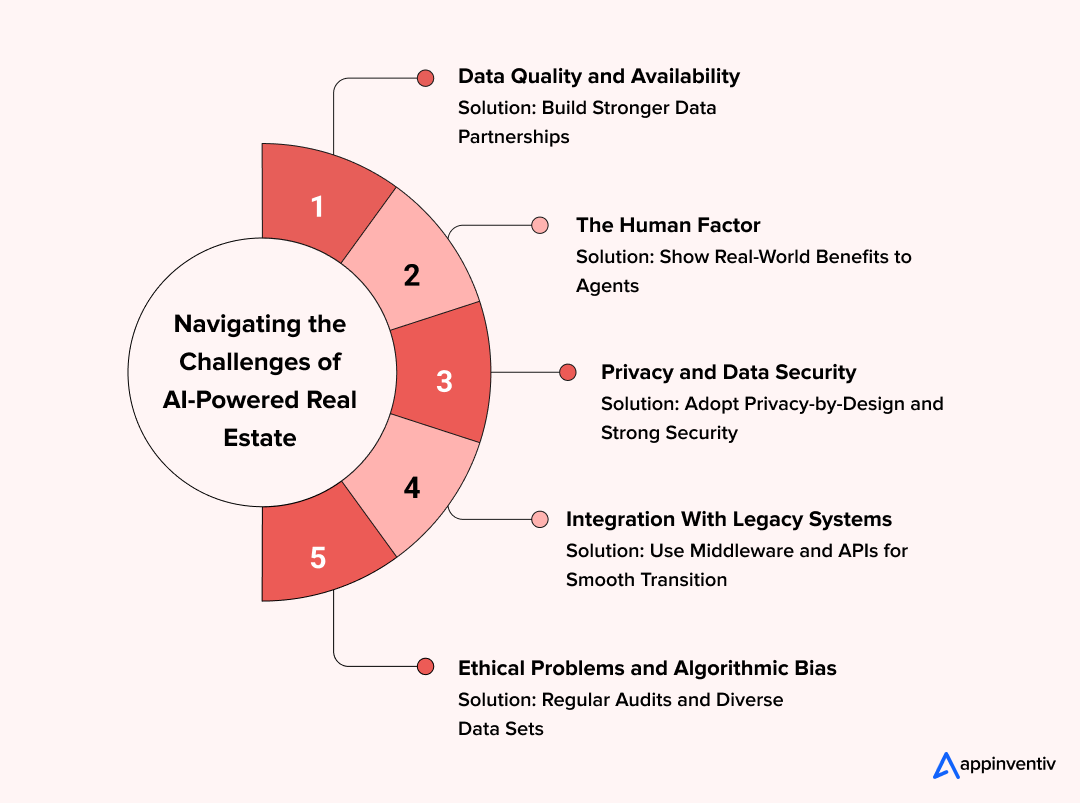
Data Quality and Availability
The biggest headache with real estate AI Australia systems? They’re only as good as the information you feed them. Australia’s property records are a mixed bag; some areas have decades of detailed information, while others have significant gaps. Different data sources often contradict each other, which means AI tools sometimes give you answers that don’t make sense.
Solution: A proficient development partner will be able to develop systems that will suck data in from various sources, make sense out of inconsistencies, and come up with a database of records. This enables AI tools to access high-quality, structured information, providing precise insights.
The Human Factor Problem
Every agency owner has dealt with this scenario. Your experienced agents—the ones who’ve been closing deals for years- take one look at AI real estate agent technology and immediately start pushing back. They’re comfortable with their current methods, they know what works for them, and frankly, they’re worried about being replaced by a computer.
Solution: Forget generic training sessions that put people to sleep. Show them real scenarios from their own work. When an agent sees how AI can qualify leads faster, provide better client insights, and free up time for relationship building, skepticism starts disappearing. The key is demonstrating that these tools make their expertise more valuable, not less relevant.
Concerns About Privacy and Data Security
AI systems process sensitive information about clients, financial, and property, which means that privacy and security are essential. AI poses a significant challenge in ensuring that the Australian laws are complied with by real estate agents using these tools.
Solution: Use encrypted databases, robust access controls, and privacy-by-design solutions to protect the information of clients and utilize AI analytics.
Integration With Legacy Systems
Most agencies use outdated software in property listing and client. The process of integrating AI and these legacy platforms may be labor-intensive and complicated, which makes real estate and AI adoption challenging.
Solution: Middleware or API solutions can be used to link the new AI platforms with the existing systems to enable a gradual transition process that does not disrupt the operations.
Ethical Problems and Algorithmic Bias
Intentionally or not, AI models can reproduce historical biases present in property data, including trends in pricing based on socioeconomic pressures or the neighborhood itself.
Solution: Audit AI algorithms on a regular basis, work with a variety of datasets, and ensure human control to make decisions in the area of Australian real estate applications ethical, impartial, and fair.
Our experts turn these hurdles into opportunities, making AI integration smooth and effective
Regulatory and Compliance Considerations for AI in Australian Real Estate
Australia’s real estate market is heavily regulated, which means AI systems must operate with care. Any solution handling buyer data, property records, or financial details needs to comply with the Australian Privacy Principles (APPs). These rules cover how personal information is collected, stored, shared, and used—making transparency and secure data handling essential for real estate businesses adopting AI.
Property transactions also fall under state-level regulations, including licensing requirements, contract rules, and disclosure obligations. AI tools used for contract reviews, tenant screening, or automated messaging must align with these standards to avoid compliance issues.
Another growing concern is AI-driven property valuations. Automated valuation models can be useful, but they may introduce bias or errors if the underlying data is incomplete or skewed. Real estate agencies should treat AI valuations as decision-support tools, not standalone replacements for accredited valuers.
The Future Of Artificial Intelligence For Real Estate in Australia
Australia’s property industry is heading toward a decade where AI does much more than handle routine tasks or guess future prices. Technologies like computer vision, natural language processing, and edge AI are about to completely reshape how we design, sell, and manage properties. Let’s have a look at what the future holds for real estate.
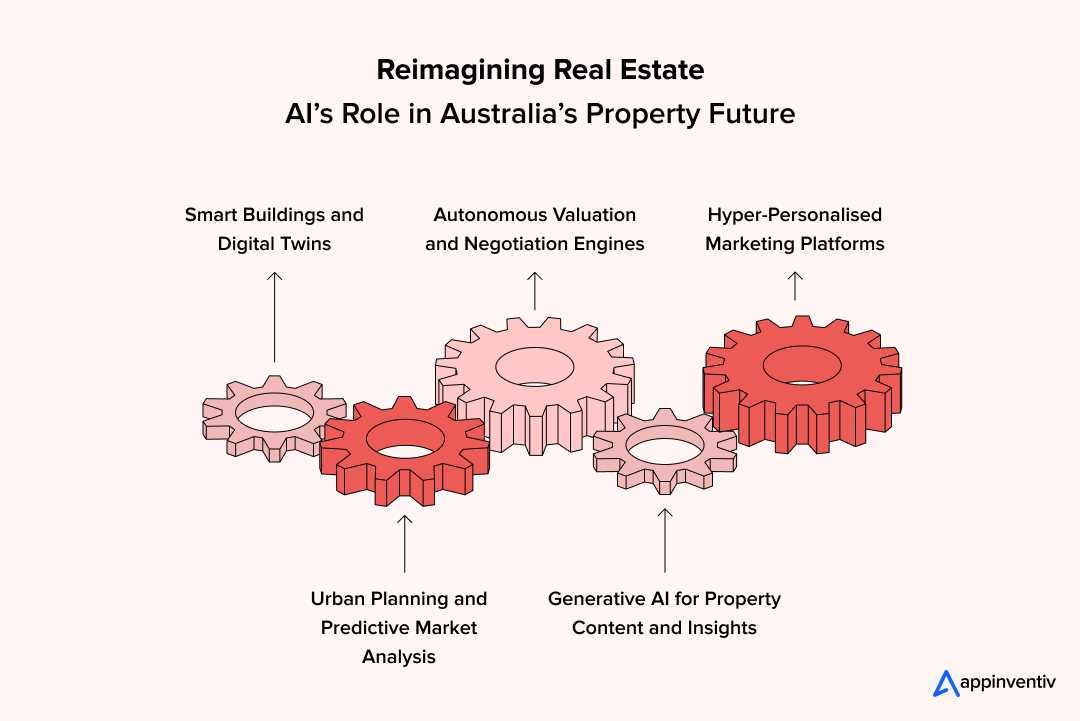
Smart Buildings and Digital Twins
Sophisticated AI will run digital replicas and live monitoring systems in buildings, delivering benefits of integration for real estate industry, including better energy efficiency, maintenance that prevents problems before they happen, and lower running costs. Developers and investors will test how tenants might behave, how weather affects buildings, and usage patterns before breaking ground on actual construction.
Also Read: How can digital twin technology help your business grow?
Urban Planning and Predictive Market Analysis
City-wide AI networks will crunch data from transport systems, population shifts, and climate patterns to support AI in real estate in Australia. Predictive urban modeling will help governments, developers, and investors forecast housing needs and make smarter land use decisions, building communities that work well for decades to come.
Autonomous Valuation and Negotiation Engines
Tomorrow’s AI will automatically value properties and handle initial price discussions, drawing on live market data, buyer patterns, and economic trends. This represents a major AI for real estate in Australia application, speeding up deals and making pricing more accurate.
Generative AI for Property Content and Insights
Generative AI in real estate will create property descriptions, marketing materials, and visual content without human input. Developers and agents will reduce time and costs while producing rich, tailored content for clients, thereby boosting engagement and minimizing errors in promotional work.
Hyper-Personalised Marketing Platforms
AI recommendation systems will build custom property marketplaces for buyers and renters. Using behavioral analysis, predictive data, and demographic information, AI for real estate marketing will enable agencies to reach the right people with personalized listings, thereby improving conversion rates and client satisfaction.
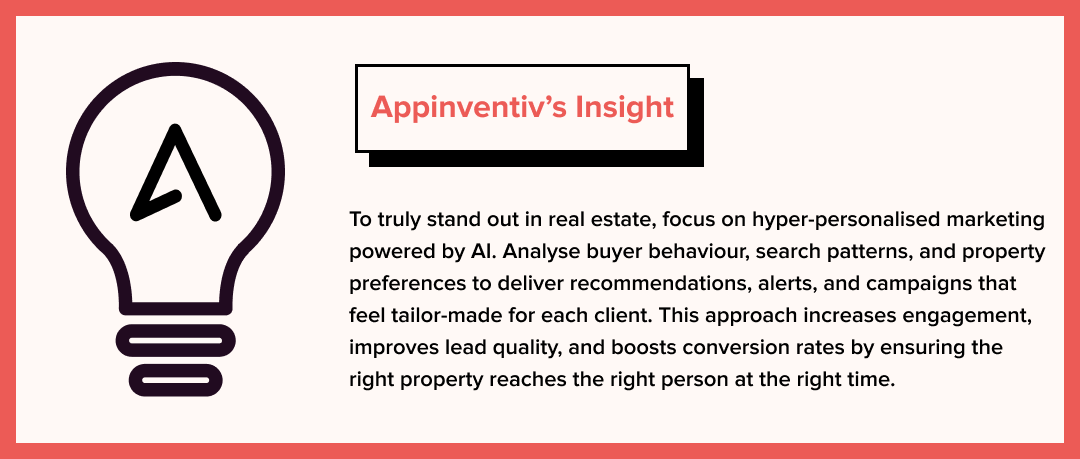
Integrate AI Seamlessly into Your Real Estate Business with Appinventiv
Australia’s property scene is changing fast, and artificial intelligence sits right at the heart of it. Professionals are making smarter decisions, reducing administrative burdens, and delivering stronger client satisfaction.AI in Real Estate in Australia gives agents, investors, and developers the edge they need. From guessing what properties might be worth next year to crafting marketing that actually works.
As a reputed real estate app development company in Australia, we worked on the ILITY platform, which is a prime example of how the power of AI can change the real estate market. ILITY is a multi-property management, scalable, SaaS-based white-label service that allows commercial property owners to fully manage their portfolios.
The platform automates AI and enables cloud-based workflows, simplifying property listing, lead management, and the transaction process, thereby increasing operational efficiency and client interactivity.

The ILITY implementation brought significant changes to the client, including a 40% increase in occupancy rates and a 20% increase in the landlord’s ROI. Such results highlight the efficiency of AI-based solutions in optimizing real estate businesses and providing real business benefits.
We also worked on Slice, a real estate investment platform that enables fractional ownership of properties. By building a secure SaaS architecture with automated financial workflows, Slice positioned the client to offer accessible property AI investments while reducing manual processes and ensuring scalability for future growth.
The success of our several technology-powered projects can be found in our client testimonials and the series of awards we received year after year, with the latest being “Leader in AI Product Engineering & Digital Transformation by The Economic Times.”
What’s next? Australian property businesses can grab predictive analytics, generative AI, and automated valuation tools by teaming up with providers offering artificial intelligence development services in Australia. Companies that jump on this early will stay nimble, leave competitors behind, and build stronger client relationships.
Getting AI integration right means property firms can handle whatever comes next while delivering real value to clients, investors, and communities. If you’re ready to explore how AI can reshape your real estate business, connect with us, your trusted technology partner.
FAQs
Q. How to use AI in real estate industry in Australia?
A. The use of AI in real estate in Australia is much more than chatbots or automatic listings. Agencies are also using AI to perform property valuations with machine learning models that analyze similar sales, suburb development, and demand variations to provide very precise figures. Predictive analytics systems can be used to determine the future neighbourhoods to invest in, whereas recommendation systems can recommend properties that suit the specific needs of a buyer.
AI-based virtual reality tours transform the experience of remote buyers, whereas intelligent CRMs offer agents a prioritized lead based on behavioral patterns. Combined, these tools optimize processes, enhance efficiency, and make the property ecosystem much more data-driven.
Q. What is the cost of building an AI-powered real estate app?
A. The average price of developing an AI-driven real estate app in Australia is between AUD 30,000 and AUD 350,000+, based on features and complexity. Simple applications with chatbots and property listings are cheaper, whereas more complex applications with predictive analytics, computer vision, or AR/VR tours will be more expensive.
The continuous cost to maintain, cloud store, and AI model refreshes typically increases 15%-20% a year. Collaborating with a well-known real estate app development firm like Appinventiv will prove to be beneficial for cost optimization and scalability.
Also Read: Cost of developing real estate apps like Zillow or Trulia
Q. How does AI benefit property buyers and investors?
A. The advantages of the buyers and investors with AI for real estate in Australia are high and quantifiable:
- Better suggestions: AI applications offer personalized property alerts according to financial, lifestyle, and location choices, reducing the time needed to search.
- Immersive experiences: The buyers are able to do immersive tours using AI because, through virtual touring, they get to view homes without visiting different sites.
- Market prediction: Investors use the use of predictive models that point out future property hotspots, rental yields, and risk evaluation.
- Financial insights: AI is useful in making comparisons between mortgages, predicting repayment risk, and analyzing portfolios for investors with multiple assets.
Q. Is artificial intelligence adoption in real estate cost-effective?
A. Yes. Many agencies find that implementing AI for real estate agents reduces manual workloads, cuts marketing costs, and boosts conversion rates. Over time, the operational savings and efficiency gains outweigh the initial investment, proving its cost-effectiveness.
Q. Which sectors of real estate in Australia benefit most from AI?
A. The implications of AI for real estate agents can be observed in a number of real estate industries:
- Residential sales: AI expands and improves client matching, facilitates remote purchase through VR tours, and speeds up the transaction time.
- Property management: AI-powered tools collect rent, screen tenants, and perform predictive maintenance, alleviating the load on operations.
- Commercial leasing: AI analyses the demand of tenants, monitors space usage, and helps predict the pattern of long-term leases.
- Real estate investment: It provides investors with automated portfolio analysis, market trend forecast, and risk reduction strategies.
Q. What are the key opportunities in AI automation for real estate?
A. Automation is one of the strongest growth drivers for the sector, showing how AI in real estate in Australia can transform day-to-day operations:
- Lead management: Scoring systems that are automated prioritize those leads with the highest likelihood of conversion, directing agents to work on them.
- Fraud detection: AI has the ability to identify any anomalies in the documentation or even transactions, reducing risks to buyers as well as agencies.
- Transaction efficiency: Automated verification system and smart contracts minimize settlement time delays.
- Customer experience: Chatbots and 24/7 assistants may have been implemented in AI automation, which guarantees a quicker response, customised service, and elevated satisfaction.


- In just 2 mins you will get a response
- Your idea is 100% protected by our Non Disclosure Agreement.
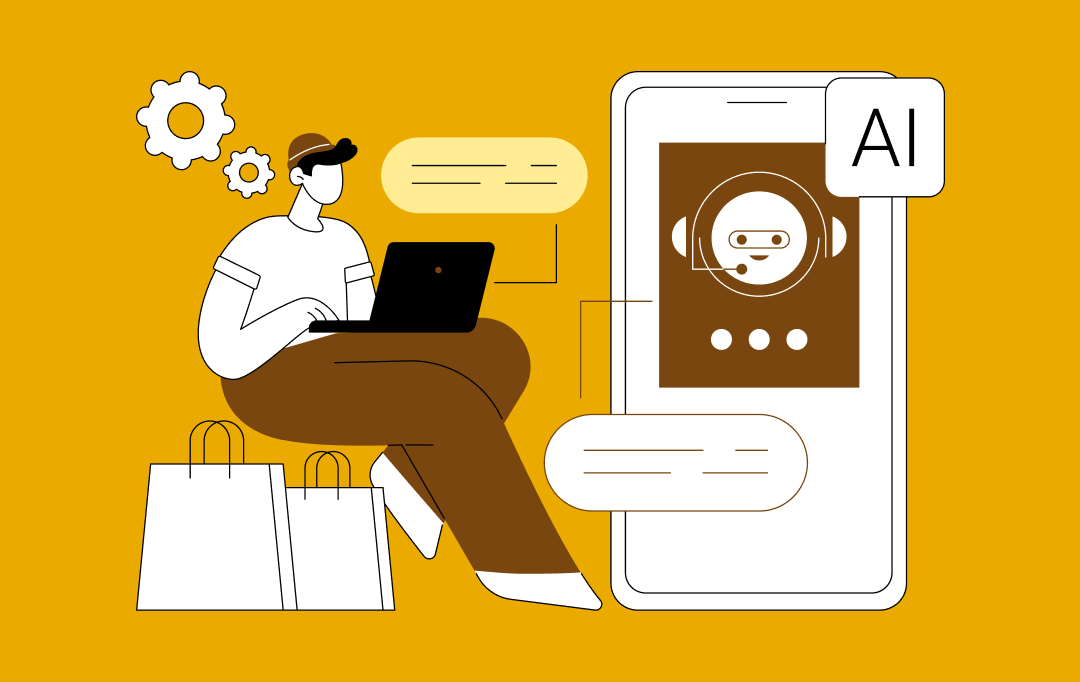
How AI Chatbots for eCommerce are Driving 3x More Sales in 2026
Key takeaways: AI chatbots for eCommerce have a direct impact on revenue. When aligned with buying intent, they lift conversions, increase order value, and drive repeat purchases. The strongest impact comes from personalization and guided selling, helping shoppers decide faster and buy with greater confidence. Abandoned cart recovery is a major revenue driver in 2026.…

AI-Powered Booking Optimization for Beauty Salons in Dubai: Costs, ROI & App Development
Key Highlights AI booking optimization improves utilization, reduces no-shows, and stabilizes predictable salon revenue streams. Enterprise salon platforms enable centralized scheduling, customer insights, and scalable multi-location operational control. AI-enabled booking platforms can be designed to align with UAE data protection regulations and secure payment standards. Predictive scheduling and personalization increase customer retention while significantly reducing…

Data Mesh vs Data Fabric: Which Architecture Actually Scales With Business Growth?
Key takeaways: Data Mesh supports decentralized scaling, while Data Fabric improves integration efficiency across growing business environments. Hybrid architectures often deliver flexibility, governance, and scalability without forcing premature enterprise-level complexity decisions. Early architecture choices directly influence reporting accuracy, experimentation speed, and future AI readiness across teams. Phased adoption reduces risk, controls costs, and allows architecture…


























